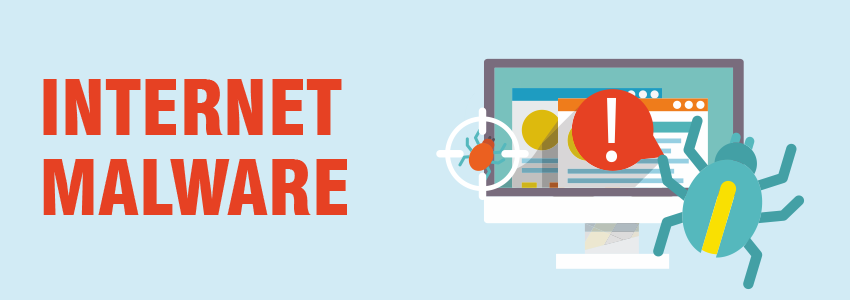WHAT IS INTERNET MALWARE – HOW TO PREVENT IT?




 (1 votes, average: 5.00 out of 5)
(1 votes, average: 5.00 out of 5)Internet malware is a harmful threat that can destroy important data and legitimate software on the computer. That’s why you need an anti malware program because different types of Internet malware can infect your computer.

WHAT ARE THE DIFFERENT TYPES OF INTERNET MALWARE?
1. Virus
A virus is an Internet malware that overwrites data by attaching itself to different programs. It spreads when the user runs the infected program. The limitation of a virus is it cannot propagate in the computer without human help.
2. Worms
Worms are self-replicating Internet malware that can destroy data and files. Just like a virus, worms also overwrite the original data to corrupt files and applications. Worms’ difference from a virus is they replicate without an executable file.
3. Trojan Horse
The term trojan horse was derived from the famous Trojan War story. Trojan horse Internet malware is stealthy. It pretends as a good application, but once installed it harms the computer. Trojan horse installs backdoor access that allows any hacker to gain access to the computer. It also installs data-stealing Internet malware such as spyware, adware, keylogger, and more.
4. Ransomware
Ransomware is an Internet malware that encrypts files and locks IoT devices. Once ransomware encrypts files, it demands a ransom that must be paid in bitcoins. If the user refuses to pay the ransom, the files get deleted after every hour.
5. Spyware
Spyware is a data-stealing Internet malware that monitors the computer silently. It records the keys pressed on the keyboard and browsing activities to steal personal information.
6. Rootkit
A Rootkit is one of the most dangerous types of Internet malware. It loads before the operating system does. It is used to steal bank account information. Any Internet malware bundled with a rootkit is difficult to remove because rootkit prevents the removal of the malware. A rootkit removal alone is hard. You need to boot the computer using external memory to get rid of it.
HOW DOES INTERNET MALWARE GET INTO YOUR COMPUTER?
Internet Malware is distributed through different methods, but below are the leading causes of malware infections worldwide.
1. Spear Phishing
Spear Phishing is a malicious email that looks legitimate. It installs malware behind the background. Most malware are distributed by phishing emails. A malware removal tool must have a spear phishing detection feature to prevent spear phishing attacks.
2. Fake Software
Any Internet malware can pretend as a mobile app, a flash player update, or a PDF file. Fake software is tricky and you need a good malware removal tool to detect and block it.
3. Drive-by-Downloads
A drive-by-download is for installing internet malware in the background. You could have just visited a website, suddenly you’ve got a malware infection. Chances are the website is infected with malware that installs internet malware without your knowledge.
HOW TO PREVENT INTERNET MALWARE?
To prevent Internet malware attacks, you need to install a reputable malware removal tool. It protects the computer against varieties of Internet malware that are lurking online.
For a personal computer, we recommend Xcitium Antivirus. It is effective and lightweight. It protects the computer without slowing it down. Because it is cloud-based, it protects the computer against the latest threats even if it is not updated. Download it for free.
For a business network, choose anti malware software with advanced endpoint protection.
Endpoint protection is essential to keep your network and endpoint devices safe from Internet malware.
Xcitium Advanced Endpoint Protection is a central security software designed to protect endpoint devices against cyber threats. It consists of the following security features:
Cloud Based Antivirus
Protects endpoint devices against the latest threats. By deeply scanning the files that enter the computer, it detects and blocks internet malware in no time.
Auto-Containment
Is a virtual container that is built upon Default Deny. It automatically contains any suspicious files that reach the computer, then it creates a shadow copy of the hard drive to see how the file will behave in the computer.
Host Intrusion Prevention System
The Host Intrusion Prevention System is designed to detect advanced Internet malware such as fileless malware. It protects the computer memory and registry against threats that evade the detection of the firewall and antivirus.
VirusScope
Detects internet malware without fixed identifiable features. It uses advanced multiple recognizers to detect harmful behavioural patterns.
Firewall
Prevents the intrusion of inbound and outbound threats to the network and endpoint devices. It also prevents unauthorized data transmission by filtering network traffic.
Valkyrie
Is a cloud-based verdict platform that determines malicious files in 40 seconds using static and dynamic analysis.
Website Filtering
Blocks malicious websites. It allows you to restrict other users from accessing inappropriate websites that may cause internet malware infections.
Different types of Internet malware are spread online. To protect your network and endpoint devices against these harmful threats, install a reputable security solution. Download Xcitium Advanced Endpoint Protection today or contact us for a live demo.
RELATED SOURCES:
Endpoint Detection
Endpoint Detection and Response
What is Anti Malware Protection?
What is Malware?
What is Malware Scanner?
Best Online PC Scan Tools
Get Free Trial Now
How To Use Trojan Horse For Hacking